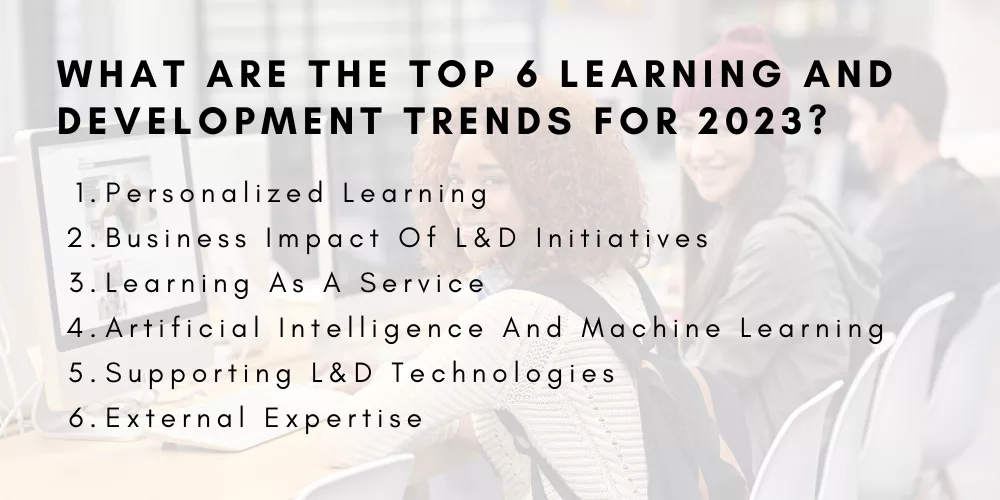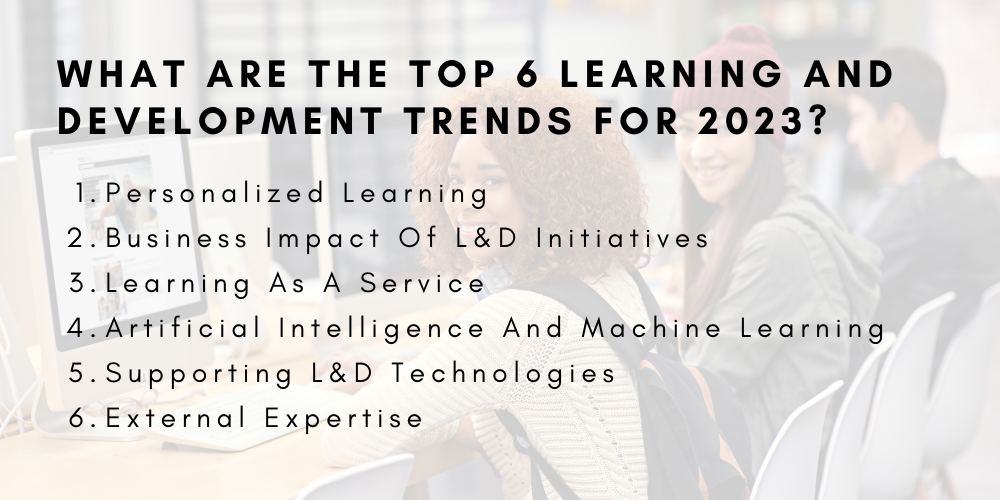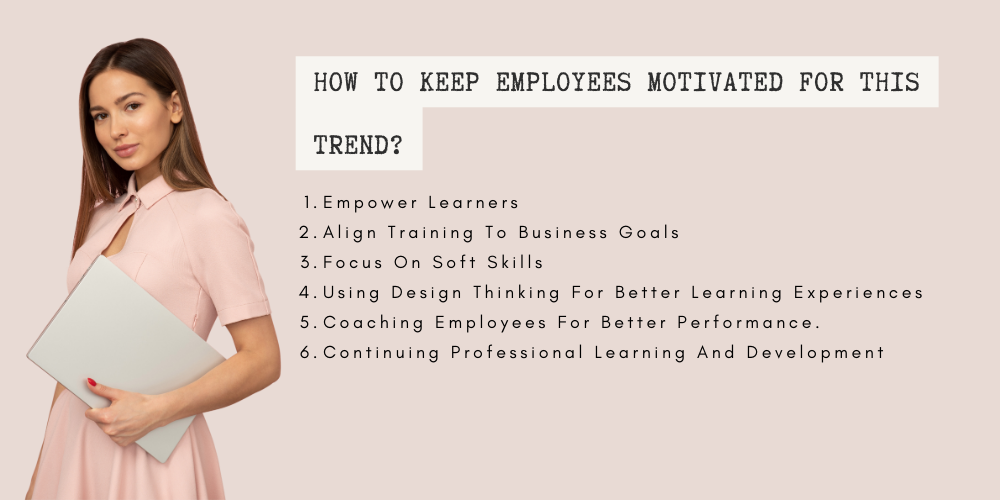6 Learning & Development (L&D) Trends to Watch (2025)
Learning and development have been a growing trend for the last few years. And there’s no sign of slowing down.
We’re seeing a continual shift in how organizations approach learning and development.
What Is Learning and Development in the Digital Workplace?
A digital workplace is a place where people work and learn together.
It’s where people work with technology to create value for their organization, be it in terms of efficiency or innovation.
But, the digital workplace is changing the way we work. In this new environment, technology enables learning from peers and mentors. You can take examples of:
- Social media channels (Facebook groups);
- Video conferencing tools (Google Hangouts);
- Messaging apps (Slack); and
- Collaborative software (Jira)
This dynamic leads to increased knowledge sharing across all organizational levels.
It is something many leaders consider one of the most significant advantages of having a digital workforce!
Trending Courses:
Top 6 Learning and Development Trends for 2025
Here are six key trends if you’re looking to keep your organization ahead of the curve. These trends can potentially shape the future of L&D over the next year:
1. Personalized Learning
Personalization is becoming more critical. Before, learners had to choose from vast content and learning resources. But, with the application of personalization during the learning process-
- L&D teams can access more data about learners and
- Use better technology to train them.
Furthermore, personalized learning helps update content based on learner progress or other signals.
Leadership Development Learning Track
2. Business Impact Of L&D Initiatives
The business impact of L&D initiatives is an important topic that we will hear about more in the coming year.
It is because companies are measuring the results of their L&D efforts to show clear ROI.
Further, the good news is that you can measure the impact of your L&D initiatives by asking a few key questions:
- What does success look like?
The first step in measuring outcomes is to define them clearly.
For example:
If you’re trying to improve employee retention rates, you can define a successful outcome might as:
- All employees who have been with us for one year or less are still with us after three years or
- Retention rates increase by 2% each year for five years.
- How will you know if you’ve achieved your goals?
You need regular benchmarks. They will help you compare performance data over time (e.g., quarterly surveys).
Further, you can use benchmarks to measure progress toward achieving your desired outcomes.
Developing And Rewarding Others Learning Track
3. Learning As A Service
Learning as a service is breaking down the learning into smaller chunks.
Learners can consume this in bite-size or all in one go, depending upon their suitability.
Furthermore, trainers can implement learning as a service using many different methods, including:
- Ebooks and videos hosted online (eLearning); or
- Print format (print & online).
The benefit of learning as a service is that it allows you to offer the following:
- More flexible; and
- Cost-effective options for learners.
Further, you will also be able to reach learners who may otherwise not have access due to time limitations or location restrictions.
Learn To Solve Your Problems Now Through NLP (Course)
4. Artificial Intelligence And Machine Learning
Artificial intelligence (AI) is a broad term that includes machine learning.
Furthermore, machine learning is a subset of AI.
Learners and trainers can both use machine learning in many different ways, including:
- Help with decision-making;
- Make recommendations; or
- Automate tasks
Further, AI can help with L&D.
For example, you could create an employee engagement survey.
The survey will automatically send out the results when employees meet its criteria.
Furthermore, you can analyze the results of this survey using ML algorithms.
It will help you know what areas employees need more learning to improve their skills.
Enroll Now –
5. Supporting L&D Technologies
Technology is a critical element of learning, and it’s only getting more important.
So, what should you be looking for when choosing technology to support your L&D strategy?
- You’ll want to understand how technology can enhance your company’s learning programs.
- You will want to explore the many available options.
- Consider how the different types of technology can help you achieve your goals.
- Consider the benefits and challenges of using different technology-based tools, like video chat or virtual reality.
6. External Expertise
Organizations will likely need to draw on external expertise as they become more complex and diverse.
It is because expertise helps them navigate their challenges.
Further, external experts can help organizations with staying at the forefront of change and innovation by guiding their learning programs.
However, this external expertise must align with the organization’s goals.
So, organizations should provide The individual or organization providing the external support with appropriate skills and experience for the task.
It’s also crucial that these external experts understand how their role fits into an organization’s learning culture. Furthermore, before engaging them in projects or initiatives, they must consider this point.
Finally, organizations must invest sufficient time and resources to ensure that all consultants have been adequately trained. It will help check that they are not contributing negatively to organizational culture or performance.
Want to explore more trends?
Must Read – 11 LMS Trends That Will Impact LMS Adoption And Use
How To Keep Employees Motivated For This Trend?
Here are some tips for keeping your employees motivated when it comes to learning and development:
Empower Learners
- To take ownership of their development.
- To access learning and development, they need it when they need it.
- And measure their learning and use feedback for continuous improvement.
Align Training To Business Goals
You must use training to help your employees achieve defined business goals.
Further, before you design any learning programs, you should:
- Define these goals and
- Make them clear throughout the organization.
It will help everyone know what they are aiming for.
You can then use your training efforts to help people:
- Improve their knowledge and skills
- Adapt their behavior (for example, improve their communication)
Focus On Soft Skills
- Soft skills are the foundation of your career.
- They’re something you can learn.
- They’re relevant to your industry and role.
Specific soft skills are essential in every job.
And developing these is the key to building a successful career.
10 Soft Skills You Need Course
Using Design Thinking For Better Learning Experiences
Design thinking is a process for solving problems.
It involves five stages:
-
Empathize
-
Define
-
Ideate
-
Prototype
-
Test
In the empathize stage, you explore your users’ needs.
Further, in the defined stage, you identify their goals and values.
In the ideate stage, you develop ideas to solve those problems.
In the prototype stage, you create a rough model of your solution.
And in the end, you get feedback from real users during testing.
The feedback will help you understand whether what you created helped them achieve their goals.
Save Thousands Of Dollars With Coggno Prime Subscription
Coaching Employees For Better Performance
Coaching is a two-way process, so you must be ready to learn as much as your employees.
Further, employees and employers must both commit to the learning process.
Moreover, coaching is a long-term commitment.
It is not just an intervention for short-term performance problems or one-time training sessions.
Continuing Professional Learning And Development
Continuing professional learning and development is critical for any employee.
But it can take time to track the effectiveness of your program.
So, what’s the best way to measure the impact of continuing professional learning and development (CPLD)?
It is by looking at an individual’s performance and overall job satisfaction.
While it can be challenging to measure results, there are some key measures you should consider:
- Does an employee have a better understanding of their role?
- Are they able to perform their duties more effectively?
- Are they happier in their position?
The goal is that CPLD helps employees improve their work by equipping them with new knowledge or skills.
Conclusion
Learning and development trends are constantly changing.
By keeping up with these trends, you can provide your employees with the tools they need to succeed in their careers and support the company’s growth.
For more meaningful blogs explore the Coggno Blogs section.
For training and courses, visit the Training & Courses page.






















